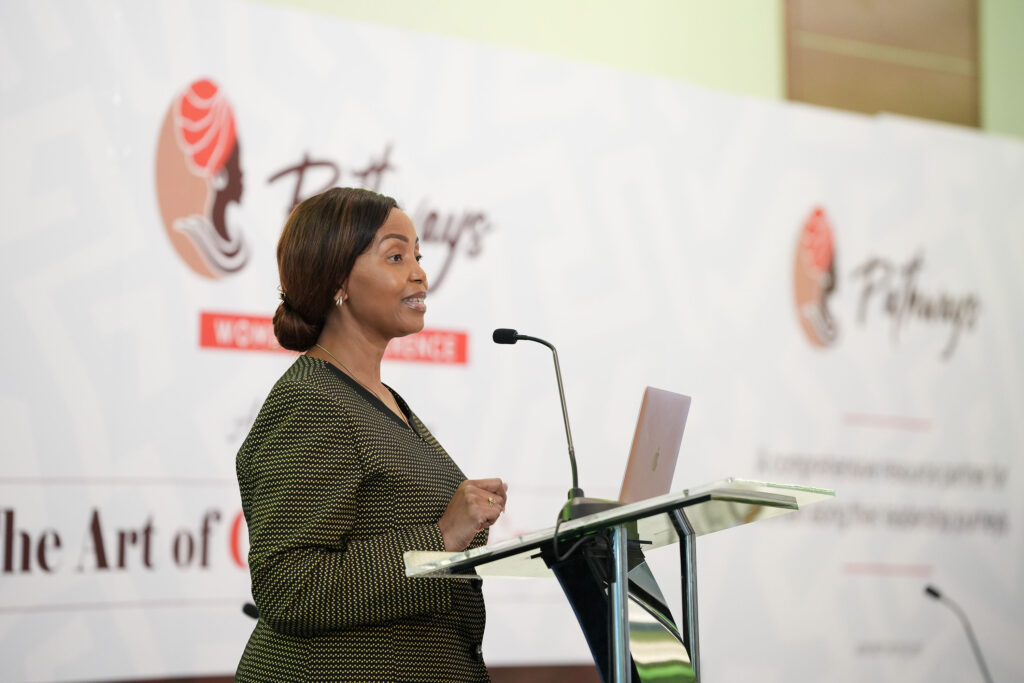
The Pathways Women’s Conference opened with a powerful reflection by Liz Anduvate, our Executive Director, on the shared aspirations and collective strength of women leaders. A reminder that every individual present carried the dreams and hopes of those who had walked before them – individuals with unique talents, common aspirations, and a shared commitment to growth.
At the heart of the gathering was Pathways, introduced as a transformational resource for women in leadership, created to foster empowerment and sustainable growth. The conference explored the idea of Gravitas as both a personal trait and a leadership tool that is essential for building intergenerational legacies that transcend position or power.
Learning Leadership Lessons from Elephants
One of the most memorable moments was her use of the Elephant as a metaphor for leadership and resilience. Elephants, she explained, embody characteristics that women leaders can learn from:
-
- Adapting to the environment: Elephants adjust to forests, savannahs, and even human-encroached areas, finding ways to thrive despite challenges.
-
- Embracing new challenges: They learn to source water in droughts, use tools, and change migration routes to survive.
-
- Passing knowledge across generations: Wisdom flows from the older elephants to the younger, ensuring continuity and resilience.
As elephants carve out new trails in dense forests that later become lasting pathways, women in leadership must also forge new routes, ensuring those who follow have a clearer, stronger way forward. This analogy can be tied to real-life examples, including Tegla Loroupe, the renowned marathon champion and peace ambassador. Despite doubts about her physical frame and the hardship of training barefoot, Loroupe persevered to win multiple titles. Her journey was not just about personal success but about opening doors for others who once doubted their own potential.
True leadership is not about simply occupying space. Like elephants that sustain ecosystems by planting seeds and maintaining balance, impactful leadership is measured by service and long-term contribution. Influence is not about breadth alone but about depth — ensuring that the work done today nourishes generations yet to come. This approach finds resonance in figures such as Graça Machel, whose legacy in healthcare, children’s rights, and social justice demonstrates a leadership style rooted in service rather than power. Such leadership is about cultivating values that yield enduring change.
At the core of the conversation was gravitas — the defining quality of leaders who carry weight, wisdom, and presence. Gravitas is not performance but a reservoir of character that commands respect. It is earned over time, through resilience, integrity, and consistent action. Leaders with gravitas shape conversations with depth and intention, leaving behind legacies that far outlive titles. True authority is earned over time. Just as Tegla Loroupe’s enduring legacy is built on resilience and service, gravitas is developed through years of consistent action and commitment.
Collaboration and Continuity
Echoing the African proverb, “If you want to go fast, go alone. If you want to go far, go together,” Liz emphasized that leadership thrives in collaboration and connection. Like elephants, who depend on herds for survival, women leaders must build networks, embrace mentorship, and ensure intergenerational knowledge transfer. It is imperative that women honor those who illuminated their own paths and to accept the responsibility of guiding others. Drawing from the wisdom of planting trees, she reminded the audience: “The best time to plant a tree was 20 years ago. The second-best time is today.”
One of the most compelling illustrations of resilience came through the story of a woman who returned to the workforce after a 17-year absence. Stepping back into professional life after nearly two decades was no small feat. The workplace she had once known had changed dramatically — new technologies had emerged, workplace cultures had shifted, and the pace of innovation demanded constant adaptation. Yet, despite these challenges, she chose not only to re-enter but to thrive, embracing the uncertainty with courage and determination.
Her journey highlighted the essence of adaptability: the ability to adjust to evolving environments, learn new skills, and find one’s footing in unfamiliar terrain. More than that, it underscored the power of purpose. Leadership is not defined by uninterrupted progress but by the willingness to rise, begin again, and align one’s experiences with a vision that serves others.
This arc reflects the timeless pattern of the hero’s journey. Every great leader is, at some point, called beyond comfort into uncharted territory. The trials encountered along the way refine their character and reveal strengths that might have otherwise remained hidden. Yet the journey does not end there. True fulfillment is found in returning — bringing back the lessons, wisdom, and resilience gained, and using them to uplift communities and inspire others to step boldly into their own journeys.
Leadership, then, is not simply about achievements or titles. It is about how one navigates change, embraces challenges, and ultimately transforms personal trials into pathways for collective growth.
A Call to Action
This is a charge to you to embrace your leadership journeys with depth, poise, and purpose by practicing these aspects:
-
- Maintain existing pathways that others have laid before them
-
- Create new opportunities for generations to come
-
- Embody gravitas in every sphere of life
The Pathways Women’s Conference left behind more than inspiration — it offered a vision of leadership that is resilient, intergenerational, and grounded in service. Like elephants pressing through the forest, women leaders are called to create pathways that widen over time, ensuring that those who follow can journey farther, with greater ease and confidence.
